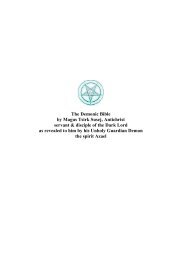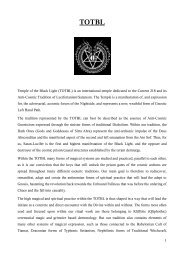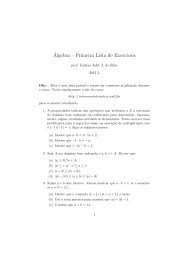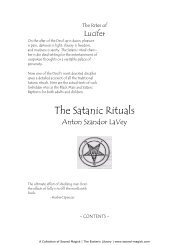Satanism Today - An Encyclopedia of Religion, Folklore and Popular ...
Satanism Today - An Encyclopedia of Religion, Folklore and Popular ...
Satanism Today - An Encyclopedia of Religion, Folklore and Popular ...
Create successful ePaper yourself
Turn your PDF publications into a flip-book with our unique Google optimized e-Paper software.
Mind Control, Satanic 177<br />
sonalities so that, should agents be caught <strong>and</strong><br />
interrogated, they could not reveal their true<br />
missions. The idea was that an alternate subpersonality,<br />
which was programmed to follow the<br />
dictates <strong>of</strong> the programmer, could be triggered by<br />
certain key words or other cues implanted in the<br />
agent by posthypnotic suggestion.<br />
For believers in Satanic ritual abuse, the MK-<br />
Ultra scenario explained, for instance, why the<br />
women who claimed to have been “breeders” for<br />
babies sacrificed by Satanic cults could have<br />
performed this function while apparently leading<br />
ordinary, even innocuous lifestyles. This exotic<br />
theory was invoked, at least implicitly, by Satanic<br />
ritual abuse advocates, despite the fact that the CIA<br />
was apparently never successful in inducing such<br />
states in its experimental subjects. The mindcontrol<br />
hypothesis explained how the victims could<br />
have forgotten the abuse that RMT supposedly<br />
recovered. While on the one h<strong>and</strong> ritual abuse<br />
advocates relied upon MK-Ultra-type notions, on<br />
the other h<strong>and</strong> they drew from popular stereotypes<br />
about “cult” brainwashing/mind control. For<br />
example, the Los <strong>An</strong>geles County Task Force on<br />
Ritual Abuse described Satanic cult brainwashing as<br />
follows: “Mind control is the cornerstone <strong>of</strong> ritual<br />
abuse, the key element in the subjugation <strong>and</strong><br />
silencing <strong>of</strong> its victims. Victims <strong>of</strong> ritual abuse are<br />
subjected to a rigorously applied system <strong>of</strong> mind<br />
control designed to rob them <strong>of</strong> their sense <strong>of</strong> free<br />
will <strong>and</strong> to impose upon them the will <strong>of</strong> the cult<br />
<strong>and</strong> its leaders.” This characterization makes<br />
Satanic programming appear less a form <strong>of</strong> CIA<br />
mind control <strong>and</strong> more a subcategory <strong>of</strong> the kind <strong>of</strong><br />
brainwashing that the popular press has attributed<br />
to Moonies, Hare Krishnas, <strong>and</strong> others. This makes<br />
social-scientific analyses <strong>of</strong> “cult”mind control relevant<br />
to the issue <strong>of</strong> Satanic programming.<br />
Since the mid-1970s, mainstream scholars—<br />
particularly sociologists <strong>of</strong> religion—have been<br />
steadily churning out studies directly relevant to<br />
the cult controversy. With respect to the brainwashing<br />
or mind control accusation that is at the<br />
core <strong>of</strong> the cult stereotype, the operative question<br />
that social scientists asked was: How does one<br />
distinguish “cult” brainwashing from other forms<br />
<strong>of</strong> social influence—like advertising, military<br />
training, or even the normal socialization routines<br />
<strong>of</strong> the public schools Some anticultists theorized<br />
that “cult” members were trapped in a kind <strong>of</strong><br />
ongoing, quasi-hypnotic state, while others<br />
asserted that the ability <strong>of</strong> “cult” members to<br />
process certain kinds <strong>of</strong> information had<br />
“snapped.” The problem with these <strong>and</strong> similar<br />
theories is that if cultic influences actually overrode<br />
the brain’s ability to logically process information,<br />
then individuals suffering from cultic<br />
influences should perform poorly on I.Q. tests, or,<br />
at the very least, should manifest pathological<br />
symptoms when they take st<strong>and</strong>ardized tests <strong>of</strong><br />
mental health—<strong>and</strong> when tested, they do not.<br />
In the face <strong>of</strong> many scholarly studies debunking<br />
cult mind control, social scientists asked the<br />
further questions <strong>of</strong>: Given the lack <strong>of</strong> empirical<br />
support, where did the brainwashing notion originate<br />
<strong>An</strong>d, What was the real nature <strong>of</strong> the conflict<br />
that the “cult” stereotype obfuscated The generally<br />
accepted conclusion <strong>of</strong> sociologists (as analyzed,<br />
for example, in David Bromley <strong>and</strong> <strong>An</strong>son Shupe’s<br />
book-length study, Strange Gods: The Great<br />
American Cult Scare) was that the principal source<br />
<strong>of</strong> the controversy was a parent-child conflict in<br />
which parents failed to underst<strong>and</strong> the religious<br />
choices <strong>of</strong> their adult children, <strong>and</strong> attempted to<br />
reassert parental control by marshaling the forces<br />
<strong>of</strong> public opinion against the religious bodies to<br />
which their <strong>of</strong>fspring had converted.<br />
This core conflict was then exacerbated by an<br />
irresponsible mass media less interested in accuracy<br />
than in printing exciting stories about weird<br />
cults that trapped their members <strong>and</strong> kept them in<br />
psychological bondage with exotic techniques <strong>of</strong><br />
“mind control.” Also, once an industry was established<br />
that generated enormous pr<strong>of</strong>its through<br />
the “rescue” <strong>of</strong> entrapped “cult” members<br />
(“deprogramming”), special interest groups were<br />
created that had a vested interest in promoting the<br />
most negative stereotypes <strong>of</strong> alternative religions.<br />
In the case <strong>of</strong> Satanic ritual abuse, however, the<br />
issue was not that parents were upset because their<br />
children had run <strong>of</strong>f to worship the Devil. Rather,<br />
accusations about Satanic cults sacrificing <strong>and</strong> ritually<br />
abusing individuals took hold in the conservative<br />
Christian subculture—a subsection <strong>of</strong> the larger<br />
population that believed in the real existence <strong>of</strong> a<br />
supernatural being corresponding to the traditional
















